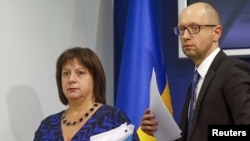Ukraine said on Thursday it was prepared to battle Russia in court after the Kremlin refused to join a critical debt swap deal for the beleaguered country that has been accepted by the majority of its other creditors.
The debt relief deal plays a key part in Ukraine's plans to shore up its war-torn economy, which has been brought close to bankruptcy by the separatist conflict in its eastern provinces after years of corruption and economic mismanagement.
Ukraine had agreed the debt exchange with a group of its largest creditors in August in order to plug a $15-billion funding gap under an International Monetary Fund-led $40-billion bailout program, but bondholders still needed to approve the plan by vote on Wednesday.
"More than 75 percent of creditors on each bond voted for the restructuring," Prime Minister Arseny Yatseniuk said. "As expected, the only country that didn't take part in the voting was the Russian Federation."
A $3-billion Eurobond held entirely by Russia is included in the 14 sovereign and sovereign-guaranteed bonds earmarked for restructuring, but the Kremlin has repeatedly said it will not participate in the process, arguing the debt has the status of an official loan as opposed to a commercial one.
The vote on the issue had been adjourned to Oct. 29 due to the lack of a quorum, Ukraine said in a statement on the web site of its information agent. Ukraine would propose the same conditions again to Moscow at that meeting, said Yatseniuk.
"If they think they're unique, we're prepared to go to court," Yatseniuk said in a briefing. "We are willing to go to legal war with Russia."
Moscow bought the bond from Kyiv in December 2013 as part of a plan to rescue the pro-Russian president Viktor Yanukovich in the face of street opposition to his rule. He fled two months later as protests widened, opening a rift between Moscow and the new pro-European leaders who followed him.
Negotiations over repayment of the bond, which Moscow wants settled in full and on time in December this year, are complicated by Russia's subsequent annexation of Crimea and its backing for separatists in eastern Ukraine.
Legal war looms
The IMF has not yet decided whether it views Russia's bond, which matures on Dec. 20, as official sector debt. Ukraine insists it will not pay the debt in full or offer better repayment terms than those offered to other creditors.
Kremlin spokesman Dmitry Peskov said Thursday that Moscow's stance on restructuring Ukraine's debt had not changed. Earlier this week Russian President Vladimir Putin said the IMF should lend Ukraine the $3 billion to pay off Russia.
Ukraine's bonds do not have cross-default clauses, meaning holdouts cannot sink the entire restructuring deal.
The deal has been seen widely as favorable to investors, and many analysts have cast doubt over whether it is a good one for Ukraine itself.
Ukraine is to now issue nine new bonds with maturity dates from 2019 to 2027, all paying a yield of 7.75 percent. Holders of two issues maturing in 2015 can swap their holdings for 2019 bonds — the shortest maturity available in the new series.
The restructuring also provides for a 20-percent writedown on the bonds' principal with the shortfall made up for with growth-linked instruments, so-called Value Recovery Instruments (VRI), kicking in from 2021, expiring in 2040, and paying out only when growth is above a certain threshold.
Evghenia Sleptsova from Oxford Economics said the potentially costly warrants were only one concern.
"Growth prospects are still very dim, the progress with reform is very slow," said Sleptsova. "The bigger worry is not the warrants, but when Ukraine is due to start repaying in 2019, whether it will be in good shape to start repaying, because the haircut was pretty light."
Buoyed by the better-than-expected terms, Ukraine's bonds have risen more than 20 cents since the plan was agreed in late August.





